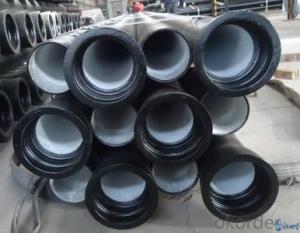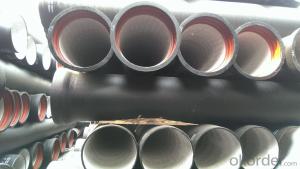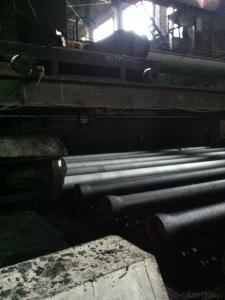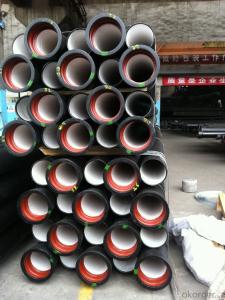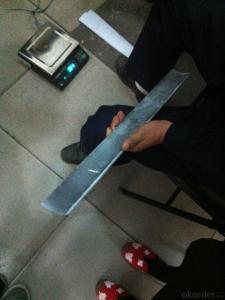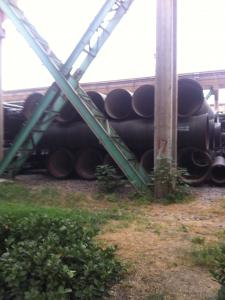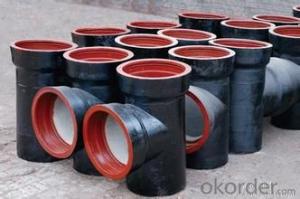DUCTILE IRON PIPE AND PIPE FITTINGS K9 CLASS DN125
- Loading Port:
- Tianjin
- Payment Terms:
- TT OR LC
- Min Order Qty:
- 20 pc
- Supply Capability:
- 3000 pc/month
OKorder Service Pledge
OKorder Financial Service
You Might Also Like
Material : Ductile Cast Iron
Size Range : DN 80mm to DN 2000mm
Unit Effective Length : 6m or 5.7m
Manufacture Standard: ISO 2531:1998/ EN 545:2006/EN 598:2007
Annual capacity : 200,000 tons
Coating Exterior: Zinc 130g/m2 according to ISO 8179-1 and bitumen coating 70 microns.
Cement Interior: Portland Cement/ High Alumina Cement/ Sulphate Resisting Cement Lining according to ISO 4179
Special requirements on external coating and internal lining can be applied
We also provide accessories such as SBR/EPDM rubber gaskets, lubricant paste, pipe caps, PE sleeves, etc.
Additional Parts:
Each pipe is strictly inspected according to related standard to ensure permanently high performance.
Easy Installation at site and service free for life
Long Service Lifespan
Quotation will arrive you within 24hours once we get your inquiry.
We guarantee offering you a competitive price.
A copy of original inspection reports of pipes will be offered after shipment.
Photos of loading process will be sent to the customer after shipment effect.
We will follow-up the delivery progress after shipment effect and update to the customer on weekly basis.
- Q: Are ductile iron pipes prone to external corrosion?
- External corrosion is not typically a concern for ductile iron pipes. This is because the material itself has protective properties. Ductile iron pipes are composed of a durable and strong material with a significant amount of graphite. The graphite serves as a natural barrier against external corrosion, effectively preventing rust and oxidation. Furthermore, ductile iron pipes are often coated with a layer of protection, such as cement mortar or polyethylene, to further enhance their resistance to corrosion. These coatings provide an additional safeguard, preventing contact between the pipe and any corrosive substances in the environment. It is important to note, however, that localized corrosion may still occur under certain conditions. Factors such as soil composition, moisture levels, and the presence of specific chemicals can potentially lead to the corrosion of ductile iron pipes in specific areas. Therefore, regular inspections and proper maintenance are necessary to promptly identify and address any potential corrosion concerns. In conclusion, ductile iron pipes are generally highly resistant to external corrosion. Nonetheless, like any other material, they require appropriate care and maintenance to ensure their long-term durability and reliability.
- Q: Is the cast iron pipe buried in need of antiseptic treatment? What kind of anticorrosive materials are used?
- It must be antiseptic. Usually hot asphalt brush painted two times, winding glass fiber cloth two road, cross construction.
- Q: Can ductile iron pipes be used for irrigation of sports fields?
- Indeed, ductile iron pipes are suitable for the irrigation of sports fields. Renowned for their robustness, longevity, and flexibility, these pipes are an excellent choice for a range of applications, including irrigation. With their ability to withstand external pressures and impacts, ductile iron pipes are particularly advantageous for sports fields that encounter heavy foot traffic and potential damage. Moreover, these pipes exhibit exceptional resistance to corrosion, guaranteeing enduring performance and minimal upkeep. The pipes' smooth interior surface also facilitates efficient water flow, preventing obstructions and ensuring adequate irrigation for the sports fields. All in all, ductile iron pipes represent a dependable and appropriate option for irrigation systems in sports fields.
- Q: Are ductile iron pipes suitable for use in mining applications?
- Yes, ductile iron pipes are suitable for use in mining applications. Ductile iron, also known as nodular cast iron, is a type of iron that has been treated with magnesium or cerium to alter its microstructure, making it stronger and more flexible than traditional cast iron. This enhanced strength and ductility make ductile iron pipes highly resistant to impact, corrosion, and abrasion, which are common challenges in mining environments. In mining applications, ductile iron pipes are often used for various purposes such as water supply, slurry transportation, and ventilation systems. Their excellent durability and resistance to wear and tear make them ideal for handling abrasive materials, chemicals, and high-pressure fluids commonly found in mining operations. Furthermore, ductile iron pipes' ability to withstand heavy loads and external pressures makes them suitable for underground mining applications, where they may need to support the weight of overlying rock layers. Their high tensile strength and flexibility help prevent pipe failure and minimize the risk of leaks or breaks, ensuring the safety and efficiency of mining operations. Additionally, ductile iron pipes are relatively easy to install, maintain, and repair. They can be welded or joined using mechanical couplings, allowing for quick and efficient installation in mining sites. Their corrosion resistance also reduces the need for frequent maintenance and replacement, resulting in cost savings for mining companies. Overall, the superior mechanical properties and durability of ductile iron pipes make them a reliable and practical choice for use in mining applications.
- Q: Can ductile iron pipes be used for railway crossings?
- Yes, ductile iron pipes can be used for railway crossings. Ductile iron is a strong and durable material that can withstand heavy loads and high traffic volumes, making it suitable for railway crossings. Additionally, it has excellent corrosion resistance properties, which is important for withstanding the harsh environmental conditions associated with railway crossings.
- Q: Can ductile iron pipes be used for water supply networks?
- Yes, ductile iron pipes can be used for water supply networks. Ductile iron pipes are known for their strength and durability, making them suitable for carrying water over long distances. They are resistant to corrosion and can withstand high pressure and external loads, making them a reliable choice for water supply systems. Additionally, ductile iron pipes have a smooth internal surface, which reduces friction and allows for efficient water flow. Overall, ductile iron pipes have been widely used in water supply networks around the world due to their excellent performance and longevity.
- Q: Will nodular cast iron pipes rust?
- Although the wall has a long flow of water, but oxygen scarce, compared with the outer wall is not easy to corrosion, but there is cement lining is necessary.
- Q: What is the difference between ductile iron and cast iron pipes?
- Ductile iron and cast iron pipes are both popular materials used in plumbing systems, but they have distinct differences in terms of composition, strength, and flexibility. 1. Composition: Ductile iron pipes are made from ductile iron, which is a type of cast iron that has been treated with trace amounts of magnesium to enhance its flexibility and strength. On the other hand, cast iron pipes are made from regular cast iron, which is more brittle and less malleable. 2. Strength: Ductile iron pipes are significantly stronger than cast iron pipes. Ductile iron has a higher tensile strength, meaning it can withstand higher levels of internal and external pressure. This makes it more suitable for applications where high strength is required, such as water mains or sewer lines. Cast iron pipes, on the other hand, are more prone to cracking or breaking under pressure. 3. Flexibility: Ductile iron pipes have greater flexibility compared to cast iron pipes. This flexibility allows them to withstand ground movement, making them less susceptible to damage or breakage caused by settling or shifting soil. Cast iron pipes, due to their inherent brittleness, are more likely to crack or separate when exposed to ground movement or vibrations. 4. Installation: Ductile iron pipes are typically joined using a mechanical joint or flanged joint, which provides a secure and leak-proof connection. On the other hand, cast iron pipes are usually joined using a bell-and-spigot joint, which relies on gaskets or lead caulking to create a seal. The mechanical joint used in ductile iron pipes offers better resistance to movement and external forces. 5. Cost: Ductile iron pipes are generally more expensive than cast iron pipes. The additional treatment process and higher strength of ductile iron contribute to the increased cost. However, the added durability and longer lifespan of ductile iron pipes can offset the initial investment, as they may require fewer repairs or replacements over time. In summary, the main differences between ductile iron and cast iron pipes lie in their composition, strength, flexibility, installation methods, and cost. Ductile iron pipes offer superior strength and flexibility, making them more suitable for demanding applications, while cast iron pipes are more brittle and prone to breakage. Ultimately, the choice between the two depends on the specific requirements of the plumbing system and the available budget.
- Q: How many meters does the cast iron water supply pipe dn150,1 tons?
- Centrifugal ductile iron pipe water-cooled metal type centrifuge daira executed by.Dg100 mm following the closed mold mold jacket cooling, more than Dg150rnm with rain type cooling.
- Q: How are ductile iron pipes inspected for quality control?
- To guarantee compliance with industry standards, ductile iron pipes undergo a series of rigorous tests and inspections for quality control. Trained inspectors conduct visual inspections, carefully examining the pipes for visible defects like cracks, pits, or surface irregularities. This process aims to identify any visual flaws that could compromise the overall quality of the pipes. Dimensional inspection is another crucial quality control measure. Specialized tools and equipment are used to measure the pipes' dimensions, including diameter, wall thickness, and length. By comparing these measurements to specified tolerances, any deviations can be detected, and necessary corrective actions can be taken. Hydrostatic pressure testing is an important step in quality control. The pipes are subjected to internal pressure higher than their intended operating pressure to ensure they can withstand the required pressure without any leakage or failure. This test involves filling the pipes with water and gradually increasing the pressure while closely monitoring for any signs of leakage or deformation. Furthermore, mechanical tests such as tensile strength testing and impact testing are conducted to evaluate the pipes' mechanical properties. Controlled forces or impacts are applied to the pipes, and their response is measured. This allows for the assessment of the pipes' strength, toughness, and durability, ensuring they meet the necessary requirements. Metallurgical examinations are also carried out to analyze the microstructure of the ductile iron pipes. Samples are taken from the pipes, and microscopy techniques are used to examine the grain structure, phase distribution, and any potential defects at a microscopic level. This process helps identify any issues that may not be visible to the naked eye but could affect the overall quality of the pipes. Overall, the inspection process for ductile iron pipes encompasses a combination of visual, dimensional, hydrostatic, mechanical, and metallurgical tests. These quality control measures ensure that the pipes meet the required standards, providing reliable and durable infrastructure for various applications.
Send your message to us
DUCTILE IRON PIPE AND PIPE FITTINGS K9 CLASS DN125
- Loading Port:
- Tianjin
- Payment Terms:
- TT OR LC
- Min Order Qty:
- 20 pc
- Supply Capability:
- 3000 pc/month
OKorder Service Pledge
OKorder Financial Service
Similar products
Hot products
Hot Searches
Related keywords
